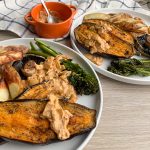
Over the last few years I have worked really hard to ensure our house becomes a zero food waste household – something that has taken time and creativity. It is also something that takes constant work as it is so easy to get a little bit lazy and slip into old habits.
If you find yourself regularly throwing stale bread away and finding random bits of not so fresh produce lurking at the back of the freezer then becoming a zero food waste household may seem like a distant dream. Although the thought may be overwhelming at first, with a few simple swaps you can really reduce the amount of food you waste. Even if you can’t see yourself at the point where you eat the leaves on the strawberries and the kiwi skin, you can easily start to build more sustainable habits using the tips below.

Before You Head To The Supermarket
Before you head to a supermarket to do your weekly shop, (or however often you go), there are a couple of things you can do to reduce the amount of food that goes to waste.
Hands down the easiest way to make sure you don’t waste food is to not buy it in the first place! Throwing random items of food into your trolley with no plan of what you will make with them and no clue if you already have them at home is a surefire way to increase waste.
It sounds a bit obvious but before you head to the supermarket you need to check which perishable items you already have in that are leftover from the previous week. A lot of us will just automatically gravitate toward the same things we usually buy, regardless of whether you actually ate the last lot. This means there is a good chance you already have a bag of carrots and a few onions lurking at the back of the pantry so you probably do not need to buy them again.
It is only really perishable items such as fresh vegetables, bread etc you need to be checking on a weekly basis, however, you’ll still need to make a note of other items like cereal and tinned goods. There is no need to do this as frequently but you should still do a little recce every six months or so to check how many tins of beans you have accumulated and put them in date order.
Making a meal plan, no matter how rough, is a great way to reduce waste and costs!
It will only take you a few minutes to make a rough meal plan for the coming week, even if it is only your evening meals, and it is one of the easiest ways to cut down on food waste. Before you write it, use the list of existing perishable items you have hopefully just made, (see above), and be sure to include meals that allow you to use these up. This means you don’t have to buy as much and you reduce food waste – just be sure to include them in meals at the start of the week so they don’t go bad.
From there, plan meals that incorporate some of the same ingredients into them so you use the entire bag of whatever vegetable it is. For example, use the entire bag of carrots by making my Vegan Smoked Salmon for breakfast, a Creamy Carrot & Ginger Soup for lunches later in the week and throwing any leftover into a Mushroom Bourguignon for your Sunday dinner. To use up red peppers you could have a Roasted Red Pepper Dip on rice cakes for lunch, throw one into this Mediterranean Vegetable Pasta Sauce and use whatever is left in these Loaded Sweet Potato Nachos. By keeping the meals varied you won’t even feel as though you are eating the same vegetables all week!
Once you have your meal plan you are then going to use it to base your shopping list on. If you only list the ingredients you need for the meals you have planned, (and your regular snacks, milk, washing up liquid etc), you hopefully won’t deviate from it once you are in the supermarket and buy excess. Not only will this reduce the amount of food waste your household produces but, again, it will also help to keep costs down.

Unpacking & Storing Your Produce
Once you return from the supermarket armed with all your goods there are a few things you can do to help prolong the shelf life of your fresh produce.
Before I unload my food shop I always empty and clean out my fridge. This only takes a few minutes and allows me to pull out all the older fruit and vegetables in there that need eating. I have a container in my fridge that I then move the older produce into so I can easily tell what needs using up first. If I just unload all the new stuff into the fridge then older vegetables get pushed to the back and I find them, inedible, a few weeks later.
We are pretty good at eating things quickly, however, if you’re not it may be an idea to learn how to properly store things. Simple hacks like keeping herbs in a jar of fresh water in your fridge and learning which fruit and vegetables should be stored separately can make a big difference in how long produce lasts.
If you are a bargain hunter and love to rifle through the reduced section, make sure you will actually eat the yellow label items and you’re not just buying them for the sake of it. Put them straight into the container in your fridge where the produce that needs eating first lives.
Why not freeze whatever you can to prevent it from going bad before you get the chance to eat it?
I don’t really buy frozen food and our freezer is actually just full of fresh produce I have frozen to make it last longer. Not only do I keep berries in there but I also have bags of kale and spinach in there to use in my smoothies. Depending on the season, (and the supermarket), I find these items can sometimes start to go bad within a matter of days so keeping them in the freezer ensures I can use them all week long AND keeps my smoothies cold!
I also keep fresh ginger and turmeric in the freezer to extend its shelf life! Just grate some off, (skin and all), into recipes when you need it and pop it back in the freezer – it retains its flavour and aroma well and will last for months.
Bread is another item I tend to freeze straight away, especially if it is nearing its best before date, and then just get out as and when I want it. Gluten free bread is always better toasted so it doesn’t even matter if you forget to get it out to defrost beforehand. If you struggle to use other fresh produce up before it goes bad, eg carrots and broccoli, it may even be a better idea for you to buy it frozen so it doesn’t go to waste.

What Else Can You Do?
When it comes to the act of cooking itself there are a few things you can do to really take some steps to build sustainable habits and become a zero food waste household.
We often have good intentions when we cook and make extra to eat over the next few days. I believe there are two types of people in the world – the ones who actually eat the leftovers the following day and the ones who put it in tupperware and freeze it knowing full well it will never again see the light of day. If you are still doing the latter then the chances are this probably won’t change and you are better off working on your portion control so the leftovers do not go to waste.
Using what I call the scrappy bits of vegetables in your meals as well as the usual parts is a huge step in becoming a zero food waste household. Things like cauliflower leaves can get thrown into stir frys, vegetable and potato peelings can be made into homemade crisps, pumpkin seeds can be seasoned and roasted to make a tasty snack, etc! Also keep in mind that a lot of the time the entire fruit or vegetable can be eaten! The leaves on strawberries, skin on the kiwi and core of the apple are all edible and root vegetables such as butternut squash and parsnips can be roasted whole instead of removing the skin. Consider composting anything you can’t eat, such as egg shells, or freezing parts of the vegetables you haven’t eaten and using them to make stock at a later date.
It also helps to have a couple of recipes in your repertoire that can be made when you have multiple vegetables or herbs that need using up at once. For example, my Zero Waste Mung Bean Chilli is super versatile as you can throw more or less any vegetables in that need eating. My quick and easy Chimichurri is also a great one to have mentally filed away if you have lot of herbs that need using! Soups, smoothies, stews, pasta dishes and juices are all great ways to use up multiple bits of fresh produce at once!
If you found my tips on how to become a zero food waste household helpful and want to show some support please leave a comment below or visit my Ko-Fi account to donate! x






0 Comments